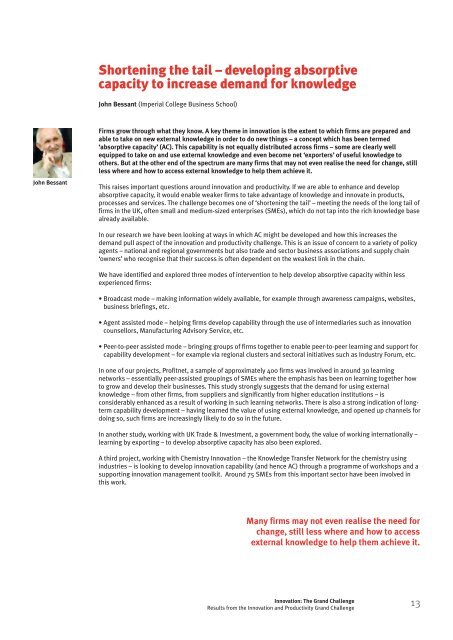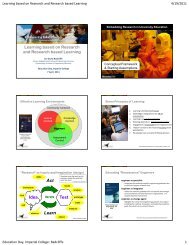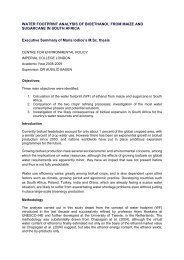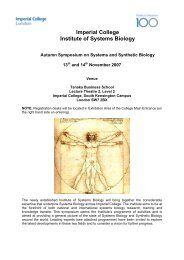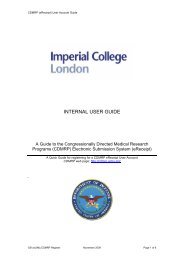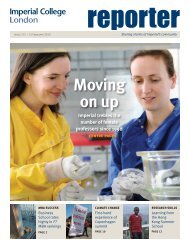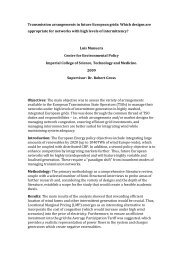INNOVATION: THE GRAND CHALLENGE - Imperial College London
INNOVATION: THE GRAND CHALLENGE - Imperial College London
INNOVATION: THE GRAND CHALLENGE - Imperial College London
Create successful ePaper yourself
Turn your PDF publications into a flip-book with our unique Google optimized e-Paper software.
Shortening the tail – developing absorptive<br />
capacity to increase demand for knowledge<br />
John Bessant (<strong>Imperial</strong> <strong>College</strong> Business School)<br />
John Bessant<br />
Firms grow through what they know. A key theme in innovation is the extent to which firms are prepared and<br />
able to take on new external knowledge in order to do new things – a concept which has been termed<br />
‘absorptive capacity’ (AC). This capability is not equally distributed across firms – some are clearly well<br />
equipped to take on and use external knowledge and even become net ‘exporters’ of useful knowledge to<br />
others. But at the other end of the spectrum are many firms that may not even realise the need for change, still<br />
less where and how to access external knowledge to help them achieve it.<br />
This raises important questions around innovation and productivity. If we are able to enhance and develop<br />
absorptive capacity, it would enable weaker firms to take advantage of knowledge and innovate in products,<br />
processes and services. The challenge becomes one of ‘shortening the tail’ – meeting the needs of the long tail of<br />
firms in the UK, often small and medium-sized enterprises (SMEs), which do not tap into the rich knowledge base<br />
already available.<br />
In our research we have been looking at ways in which AC might be developed and how this increases the<br />
demand pull aspect of the innovation and productivity challenge. This is an issue of concern to a variety of policy<br />
agents – national and regional governments but also trade and sector business associations and supply chain<br />
‘owners’ who recognise that their success is often dependent on the weakest link in the chain.<br />
We have identified and explored three modes of intervention to help develop absorptive capacity within less<br />
experienced firms:<br />
• Broadcast mode – making information widely available, for example through awareness campaigns, websites,<br />
business briefings, etc.<br />
• Agent assisted mode – helping firms develop capability through the use of intermediaries such as innovation<br />
counsellors, Manufacturing Advisory Service, etc.<br />
• Peer-to-peer assisted mode – bringing groups of firms together to enable peer-to-peer learning and support for<br />
capability development – for example via regional clusters and sectoral initiatives such as Industry Forum, etc.<br />
In one of our projects, Profitnet, a sample of approximately 400 firms was involved in around 30 learning<br />
networks – essentially peer-assisted groupings of SMEs where the emphasis has been on learning together how<br />
to grow and develop their businesses. This study strongly suggests that the demand for using external<br />
knowledge – from other firms, from suppliers and significantly from higher education institutions – is<br />
considerably enhanced as a result of working in such learning networks. There is also a strong indication of longterm<br />
capability development – having learned the value of using external knowledge, and opened up channels for<br />
doing so, such firms are increasingly likely to do so in the future.<br />
In another study, working with UK Trade & Investment, a government body, the value of working internationally –<br />
learning by exporting – to develop absorptive capacity has also been explored.<br />
A third project, working with Chemistry Innovation – the Knowledge Transfer Network for the chemistry using<br />
industries – is looking to develop innovation capability (and hence AC) through a programme of workshops and a<br />
supporting innovation management toolkit. Around 75 SMEs from this important sector have been involved in<br />
this work.<br />
Many firms may not even realise the need for<br />
change, still less where and how to access<br />
external knowledge to help them achieve it.<br />
Innovation: The Grand Challenge<br />
Results from the Innovation and Productivity Grand Challenge<br />
13


